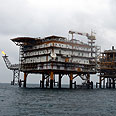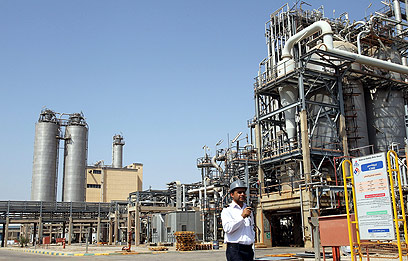
Iranian oil rig
צילום: EPA
EU moves towards agreement on details of Iran oil
Consensus emerging among European diplomats on phased implementation of embargo; EU ministers due to finalize sanctions by next week
EU states drawing up details of an oil embargo on Iran have given wide backing to a proposal to allow European entities to continue to receive repayments in oil for debts they are currently owed by Iranian firms, EU diplomats said.
The 27 states are also working towards a phased implementation of a ban on imports of oil and petrochemical products from Iran. One diplomat said a consensus was emerging that the oil import ban should come into force after six months and the petrochemical product ban after three – similar to provisions in US legislation.
Related stories:
- 'Iran being punished for no reason'
- Iran sanctions pose legal conundrum for expats
- 'White House pushes to weaken Iran sanctions'
EU states are due to agree new sanctions on Iran over its nuclear program at a meeting of EU foreign ministers on Jan. 23. They have already agreed in principle to ban imports of Iranian oil, but details on how and when this will be implemented still have to be finalized.
Greece, Italy and Spain, three of the weakest EU economies, depend heavily on Iranian crude. They have been pushing for long "grace periods" to fulfill existing contracts to allow them to find other suppliers before implementing an embargo and reduce any shocks to their already troubled economies.
EU diplomats said the EU's External Action Service – equivalent to the bloc's foreign ministry – had proposed a continuation of the practice of receiving oil from Iran to repay existing debts, and there was broad support for this.

Iranian petrochemical facility (Photo: EPA)
"Some Iranian companies have outstanding debts in Europe and they reimburse their debt, not with currency but in oil," an EU diplomat said. "It is suggested that this debt could continue to be reimbursed in oil. We are talking about existing debt -- no new debt can be accumulated."
The diplomat said the argument made was that if such reimbursements were not allowed, not only would EU entities not be able to recover their money, Iran would have more oil more available to sell to boost government revenues.
"So it would be counterproductive not to allow the reimbursement of this debt," the diplomat said.
Another diplomat said the idea was based on a proposal by Italy. "It is now quite widely backed," he said.
"Because it is such a repayment, it's not a problem. It's not scandalous because it achieves what we want to, which is to dry up Iran's resources. Now work needs to be done on the details."
Another diplomat said the EU was likely to agree to review points on the oil import ban prior to implementation, after three months and perhaps six to ensure the benefits in terms of maintaining pressure on Iran outweighed any impact on the EU or the wider oil market.
The EU is also planning new sanctions on Iran's financial sector but states have been divided over whether to include Iran's central bank in these sanctions. Diplomats said France and Britain backed this but Germany opposed the idea.
The diplomat said negotiations to finalize the sanctions are expected to continue until next week.
- Receive Ynetnews updates directly to your desktop










